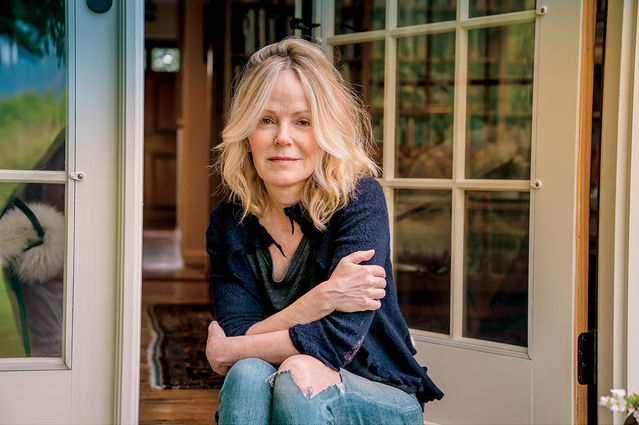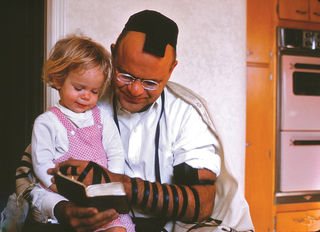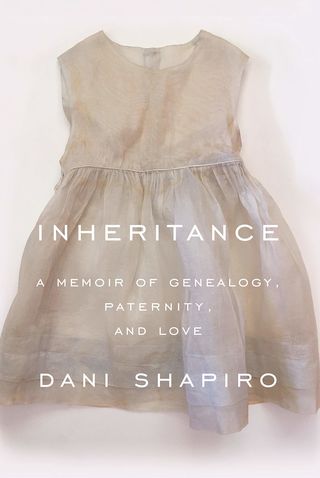When Genetic Testing Reveals a Shocking Family Secret
Genetic testing sent one woman on a quest to meet her biological parent.
By Dani Shapiro published January 2, 2019 - last reviewed on May 20, 2019
Two years ago, writer Dani Shapiro decided to take a DNA test as a lark. The test results revealed far more than she could have imagined: The man who had raised her, supported her, and loved her was not her biological father. Dani and her husband, Michael, began to unravel a complex story that her late parents, members of a prominent Jewish family, had never shared with her. She discovered that her parents had had difficulty conceiving and that, in a now-outdated procedure, her dad's sperm was mixed with that of a donor. Then Dani discovered the identity of her biological father—and decided to explore whether he might be open to meeting her.

Michael kicked off his sneakers and sat in bed next to me. My laptop was balanced between us as we waited for a YouTube ad to finish. Dr. Benjamin Walden. Five syllables—seven if you included the title. A nice mellifluous name. He had a website. It took three clicks to get there. It was a simple site, a repository of blog posts and essays he had written about medical ethics, along with links to a couple of videos. The screen went black, and then his name appeared in white sans serif type: Dr. Ben Walden speaking at Reed College, Portland, Oregon.
An older man with white hair and blue eyes was standing at a lectern.
"My god," I whispered.
Time slowed to a near standstill. I couldn't compute what I was seeing. Or rather, whom I was seeing. The man was wearing khakis, a blue button-down shirt, and a fleece vest. He had a pale complexion, but his cheeks were pink, his color high. My exact coloring. Somewhere, in the background, echoed the comments I had fielded just about every day for 54 years: You sure you're Jewish? There's no way you're Jewish. Did your mother have an affair with the Swedish milkman? I saw my jaw, my nose, my forehead, and eyes. I heard something familiar in the timbre of his voice. It wasn't merely a resemblance. It was a quality. The way he held himself. His pattern of speech.
He was recommending a book to the audience, Atul Gawande's Being Mortal. He referred to an article in The Onion. I had the bizarre thought that he had good literary taste. I ran my hands down the length of my legs. Who was I? What was I? I felt as if I might disintegrate right there in that hotel room floating high above the city. This wasn't what I wanted to see. But now that I had seen it, I would never be able to un-see it.
Dr. Ben Walden. His name continued to appear beneath the lectern. The glint of eyeglasses. A wedding ring. Michael raised the volume. The man's voice moved through me and around me like something invisible, stitched into the air. In just a moment I'll open it up to questions—
"Jesus," Michael was saying. "Jesus Christ."
Now, Ben Walden was gesticulating. He held both his hands in front of him as if bracketing the air in parentheses—a gesture that I suddenly recognized as my own. I knew in a place beyond thought that I was seeing the truth—the answer to the unanswerable questions I had been asking all my life. The audience in Portland were now raising their hands. He called on someone in the back row, then nodded, smiling slightly as he listened.
"Do you see that?" I asked Michael. "The way he's..." " He even runs a Q and A like you," Michael said.
***
What do we inherit, and how, and why? How much had the gene pool of the Waldens formed me? I did not come from the Jewish lineage I thought I had—the line of small, wiry, dark-eyed people of the shtetl, the men swaying over crumbling tombstones, prayer books in their hands. The imprint of pogroms, of the difficulties and sorrows of immigrant life was not mine—at least not in a physical sense. But I had carried these things a long way in my heart. I was of that dusty and doomed Polish village—and I was not. What had I inherited psychologically? What was in my blood? I was made of three people: my mother, my father, Ben Walden. Disparate worlds had been floating and colliding within me all my life.
People had told me every single day of my life that I didn't look as if I belonged in my family—nor did I feel I belonged in my family—yet I didn't stop to consider what this might mean. I couldn't afford to.

The clues screamed in neon, but I could not see them. After all, plenty of people feel or look "other" than their parents or siblings. Biology doesn't promise similarity. Traits skip generations. Characteristics emerge, seemingly out of nowhere. Our parents seem alien to us. My mother, certainly, had always seemed alien to me, biology be damned. And so I built my narrative edifice, brick by brick. My mother was a pathological narcissist who had borderline personality disorder; my father was depressed, shattered by marital misfortune; I was an Orthodox Jewish girl who looked as if she could have gotten bread from the Nazis; and I was the hard-won only child of my older parents. My sense of otherness derived from these—and only these—facts.
***
We were seated, as I had requested, at a secluded corner table. Checked tablecloth, leather menus, Italian bread, a small pitcher of olive oil. Our water glasses filled and filled again. We didn't touch our menus for at least the first hour. Beneath the table, I couldn't stop shaking. I had no appetite. I directed most of my conversation to Ben's wife, Pilar, but my ears were trained on Ben's conversation with Michael. They were talking of simple things, ordinary things. Both men had been in the Peace Corps. They had done some research on each other—they knew they had that in common. Ben and Pilar had read three of my books and were in the middle of a book Michael had written about foreign aid. We had all boned up, as if for an important exam. But there was something I had promised myself I would say, and I said it as soon as I had an opening to cut through the polite chitchat.
"I want to thank you," I addressed Ben. "You didn't have to do this. When I first wrote you, you could have ignored it."
His cheeks became even redder.
"He deleted it from his mailbox the second he read it," Pilar said. She had a lilting voice and retained her Brazilian accent. "Like a hot potato!"
Those interminable, surreal days obsessively checking my email. Envisioning the doctor in Portland opening my letter. He had deleted it. He had hoped it would just go away.
"Then you wrote me again," Ben said. "And I fished it out of my trash."
"I was shocked!" Pilar's voice rose. It would be months before I knew what she had really said to Ben: "How could you have been so stupid?"
"It just never occurred to me that I might have biological children out there," he said. "I donated for a short while. I honestly never thought about it after I finished medical school."
Michael and I exchanged a quick glance. It seemed purposeful, Ben's phrase. He was letting us know that he hadn't been prolific. That I did not—like some I had read about—have hundreds of half siblings. Which of course was the very scenario about which he and Pilar must have been most terrified.
In time, I would question how it could be possible that Ben—a man of medicine, who specialized in medical ethics—had never considered that he might have biological children. I would think of the three of them—my mother, my father, Ben Walden—all burying the consequences of their actions so deep that it seemed there weren't any consequences at all. But not on this day. On this day my entire being was trying to absorb as much as possible. Who knew if we would ever be together again?
I kept looking over at Ben and then away. Father. He didn't feel like my father. He hadn't raised me. We'd met hours earlier. So who was he to me—and I to him? Biological. Social. Later, it will occur to me that Ben Walden felt like my native country. I had never lived in this country. I had never spoken its language or become steeped in its customs. I had no passport or record of citizenship. Still, I had been shaped by my country of origin all my life, suffused with an inchoate longing to know my own land.
When Michael and I arrived back home, I looked through the cupboards for my usual stock of memorial candles. It was the night before Yom Kippur, and I hoped to light them to honor my parents, but we had none. I would light no candles in memory of my complicated, beloved, dead parents on the night that I met Ben Walden. Instead, I tried to hold all of them in my overflowing heart.
Later a rabbi reminded me that the Hebrew word for father, abba, is composed of the first two letters in the alphabet: aleph, bet. He asked me if I could accept the two tributaries—these two fathers I come from. I did learn to accept the two tributaries, in time. Their convergence is the story of my life. But after dinner, I sat alone on my bed, the same place where less than four months earlier I had discovered the truth of my paternity, and I wrote Ben a note of thanks. I signed this one "With love."

From the Book: INHERITANCE: A Memoir of Genealogy, Paternity, and Love by Dani Shapiro. Copyright © 2018 by Dani Shapiro. To be published by Alfred A. Knopf.
